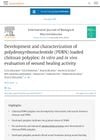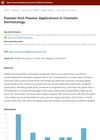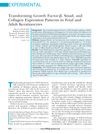
The Chromolaena odorata patch significantly speeds up wound healing.
 December 2023 in “bioRxiv (Cold Spring Harbor Laboratory)”
December 2023 in “bioRxiv (Cold Spring Harbor Laboratory)” Aged individuals heal wounds less effectively due to specific immune cell issues.
 November 2023 in “Advanced functional materials”
November 2023 in “Advanced functional materials” Magnesium Silicate Sprays help heal burn wounds and regrow skin features better than commercial products.
 November 2023 in “International Journal of Biological Macromolecules”
November 2023 in “International Journal of Biological Macromolecules” The gelatin-based hydrogel helps heal acute and diabetic wounds faster by improving healing conditions.
 September 2023 in “International journal of biological macromolecules”
September 2023 in “International journal of biological macromolecules” The chitosan/PDRN polyplex improved wound healing in diabetic rats.
 August 2023 in “ACS applied materials & interfaces”
August 2023 in “ACS applied materials & interfaces” The patch helps heal minor scald wounds by providing electrical and chemical signals to boost recovery.
 August 2023 in “International Journal of Nanomedicine”
August 2023 in “International Journal of Nanomedicine” A new wound healing treatment using a graphene-based material with white light speeds up healing and reduces infection and scarring.
 June 2023 in “Research Square (Research Square)”
June 2023 in “Research Square (Research Square)” Hyaluronic acid and polycaprolactone improve skin regeneration, with polycaprolactone having a stronger effect on healing and tissue repair.

The hydrogel helps skin heal faster and better than a commercial dressing by creating a protective environment and supporting new blood vessel and hair growth.
 September 2022 in “Open Access Macedonian Journal of Medical Sciences”
September 2022 in “Open Access Macedonian Journal of Medical Sciences” Platelet-rich plasma helps in skin healing, scar repair, and may boost hair growth in alopecia.
 August 2022 in “Research Square (Research Square)”
August 2022 in “Research Square (Research Square)” Implanted special stem cells from hair follicles helped heal wounds faster and with less scarring in mice.
 21 citations,
July 2020 in “Stem Cell Research & Therapy”
21 citations,
July 2020 in “Stem Cell Research & Therapy” Fat stem cells from diabetic mice can still help heal wounds.
 February 2010 in “Journal of The American Academy of Dermatology”
February 2010 in “Journal of The American Academy of Dermatology” The document concludes that using gadolinium-based contrast agents during MRI can be linked to Nephrogenic Systemic Fibrosis in patients with severe kidney disease.
 8 citations,
June 2022 in “International Journal of Molecular Sciences”
8 citations,
June 2022 in “International Journal of Molecular Sciences” Tiny particles called extracellular vesicles show promise for skin improvement and anti-aging in facial care but face challenges like low production and lack of research.
 2 citations,
August 2022 in “Emergency medicine international”
2 citations,
August 2022 in “Emergency medicine international” Keloid skin disorder involves abnormal fibroblast activation and immune response, linked to a group of genes including FGF11.
 March 2024 in “Advanced science”
March 2024 in “Advanced science” A new hydrogel made from human cells improves wound healing by working with immune cells to promote repair.
 4 citations,
April 2022 in “International Journal of Biological Macromolecules”
4 citations,
April 2022 in “International Journal of Biological Macromolecules” The mix of bacterial cellulose and soybean protein helps wounds heal faster, regrow hair, and reduces scarring and inflammation.
 November 2022 in “Journal of Investigative Dermatology”
November 2022 in “Journal of Investigative Dermatology” The document concludes that a new method has been developed to test anti-aging substances on human skin, showing that these substances can reduce skin aging signs.
207 citations,
September 2002 in “The Journal of clinical investigation/The journal of clinical investigation” Blocking testosterone speeds up wound healing in males.
23 citations,
November 2018 in “International Journal of Molecular Sciences” Deoxyshikonin helps wounds heal faster in diabetic mice.
 4 citations,
August 2021 in “Annals of Translational Medicine”
4 citations,
August 2021 in “Annals of Translational Medicine” Dihydroartemisinin helps reduce prostate enlargement in rats by stopping the growth of prostate cells.
 2 citations,
May 2023 in “Life”
2 citations,
May 2023 in “Life” Plumbagin may help protect cells, reduce inflammation, and has potential for treating various diseases, but more research is needed.
 December 2011 in “The Egyptian Journal of Histology”
December 2011 in “The Egyptian Journal of Histology” High-fructose diets can cause irreversible kidney damage.
 February 2010 in “Journal of The American Academy of Dermatology”
February 2010 in “Journal of The American Academy of Dermatology” Women with androgenetic alopecia may have higher blood pressure levels.
 15 citations,
June 2018 in “Life Sciences”
15 citations,
June 2018 in “Life Sciences” Diabetex improves diabetic wound healing better than metformin.
54 citations,
May 2021 in “Chemical Engineering Journal” The developed scaffold effectively treats chronic wounds by promoting healing and preventing infection.
34 citations,
September 2019 in “ACS Biomaterials Science & Engineering” Probiotic nanoscaffolds significantly improved burn healing and infection control in mice.
 May 2024 in “Journal of colloid and interface science”
May 2024 in “Journal of colloid and interface science” The hydrogel helps skin heal by encouraging new blood vessel growth.
 109 citations,
December 2003 in “American Journal of Pathology”
109 citations,
December 2003 in “American Journal of Pathology” Fetal wound healing changes with development, affecting inflammation and collagen, which may influence scarring.
 16 citations,
February 2007 in “Plastic and Reconstructive Surgery”
16 citations,
February 2007 in “Plastic and Reconstructive Surgery” Keratinocytes show more TGF-β system activity and collagen production as they age, which might affect wound scarring.


























